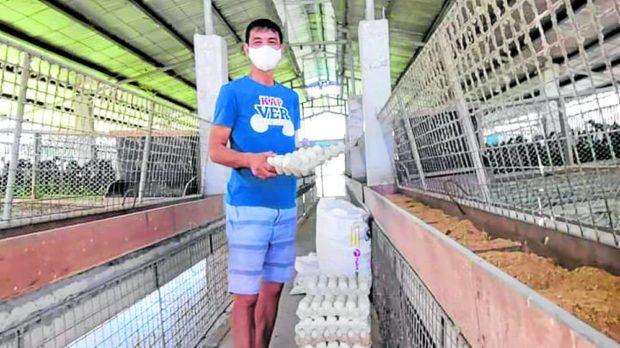Bulacan moves to protect poultry farms from bird flu

AT RISK | Ver San Pedro, chair of Barangay Lugam in the City of Malolos, shows off the eggs produced in his poultry farm in this November 2021 photo. Commercial and backyard farms in Bulacan province are cautioned against the possible bird flu infection after the type A subtype H5N1 strain of the disease was detected in Sta. Maria town. (Photo by CARMELA REYES-ESTROPE / Inquirer Central Luzon)
CITY OF MALOLOS, Bulacan, Philippines — Commercial and backyard poultry farms in the province of Bulacan have started taking measures to prevent being hit by the highly pathogenic avian influenza or bird flu T after a commercial farm in Sta. Maria town lost at least P6.2 million due to the disease, officials said on Monday.
In an interview, Dr. Voltaire Basinang, Bulacan provincial veterinary officer, said laboratory results conducted by the Bureau of Animal Industry (BAI) on Jan. 31 showed that the samples taken from the commercial farm tested positive for the type A subtype H5N1 strain of bird flu.
He said the tests were carried out after at least 80 chicken layers on the infected farm died between Jan. 17 and Jan. 25, which alarmed the farm owner.
Basinang said more than 17,000 chicken layers on the farm were depopulated between Feb. 1 and Feb. 2 to contain the viral infection.
The losses incurred by the farm only covered the cost of culled chicken layers and did not take into account the potential revenue losses, according to Basinang.
Article continues after this advertisementMigratory birds, such as egrets (Egretta garzetta), that visit Bulacan’s wetlands were suspected to have caused the avian flu infection, Basinang revealed.
Article continues after this advertisementAll commercial and even backyard poultry farms were already advised to “bird-proof” their areas and facilities to prevent the entry of wild birds into their farms, he said.
“The high-technology bird-proof approach uses tunnel ventilation, wherein the chickens are kept in cages that are fully air-conditioned,” Basinang said.
Tunnel ventilation is designed to maximize air movement that helps cool the birds and remove dust, especially during hot weather, while preventing contact with wild birds.
Surveillance zone
A kilometer-radius surveillance zone was enforced around the infected poultry to check if other farms had also been affected, Basinang said.
“We did not impose quarantine on the other poultry farms because chickens from the infected area were immediately culled,” he said.
According to the Philippine Statistics Authority (PSA), Central Luzon, including Bulacan, accounted for one-third of the country’s chicken production last year.
In the first half of 2022, the PSA said the total volume of chicken production in Central Luzon reached 325,523 metric tons, reflecting a 19.5-percent increase from the same period in 2021.
As of July 2022, there were 26 registered commercial poultry farms in Bulacan, data from the BAI showed.
Gov. Daniel Fernando on Monday called on the province’s poultry industry to strictly follow and abide by safety measures given by the local agriculture and veterinary offices in their towns and cities to prevent a similar incident.
On Jan. 8, 2021, the Department of Agriculture (DA) announced that the World Organization for Animal Health had declared the country free of bird flu after controlling the outbreaks of H5N6 in a commercial layer poultry farm in Pampanga province, and backyard poultry farms in a village in Rizal province.
But the country lost its bird flu-free status more than a year later after outbreaks of the H5N1 strain were reported in Bulacan and nearby Pampanga province.
More than 42,000 quails and ducks on farms in the provinces were culled at that time.
Human infections
The US Centers for Disease Control and Prevention said H5N1 is deadly to animals and can infect humans on rare occasions. The World Health Organization, meanwhile, reported there had been 26 H5N6 human infections reported in 2021.
The recurrence of the H5N6 strain, which also struck the country in 2017 and 2020, was confirmed by the DA on July 10, 2020, after a commercial poultry owner in Pampanga reported the sudden drop in egg production, cyanosis (dark bluish or purplish coloration of the skin and mucous membranes in chickens) and mortality.
A month later, a similar case was detected in a backyard farm in Rizal province, which affected about 500 free-range chickens and 300 Muscovy ducks.
In July last year, at least 350,000 chicken layers were culled in Pampanga’s Sto. Tomas town after the detection of the H5N1 strain in samples taken in Barangay San Bartolome from June 24 to June 27.
Outbreaks of bird flu struck Pampanga on a large scale in 2017, with revenue losses reaching P198 million, and on a minimal scale in 2021.
Several quail farms at the villages of Dalayap and Mangga in Candaba town, and San Antonio in Mexico town, both in Pampanga, were also infected with the H5N1 strain in February last year.